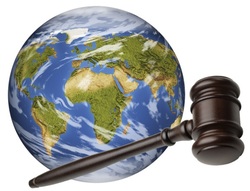 By Marti Townsend, Executive Director Hawai‘i's State House and Senate are meeting to cast the final vote on SB632 -- the bill to create an environmental court in Hawai‘i. Thanks to the support of so many, this bill is very close to passing. Your support will help push this bill to become a law! Click the links below to email elected officials in support SB632: • Email all Senators ([email protected]) • Email all Representatives ([email protected]) • Click here to see a list of all elected officials, their phone numbers, emails, and districts. (Talking points on the bill are at the bottom on this post) An environmental court in Hawai‘i will ensure that cases related to protection of our natural environment and public health will be efficiently and effectively adjudicated. SB632 provides that all cases related to statutes protecting public health and the environment are heard on the same court calendar. This alleviates the challenge of managing court dockets (and resources) between cases related to the environment and other cases, like violations against private property or people. Establishing a specific docket for environmental cases allows judges in this court to give proper attention to these cases, while developing their own expertise in this area of law. This also sends a strong message to agency enforcement staff -- and the public -- that violations of environmental protections are taken very seriously in Hawai‘i. In the past, we have seen too often environmental cases dismissed early, when cases for other felonies or misdemeanors are continued and resolved. It is true that Hawai‘i's court system has been particularly good at addressing procedural issues related to actions that might damage the environment -- the Superferry, H-3, and Waiahole water decisions immediately come to mind as examples of the courts acting to protect the environment. However, when dealing with day-to-day infractions of environmental protections -- think of catching undersized fish, releasing chlorinated pool water into storm drains, improper disposal of unwanted household or construction material -- our system of enforcement is sorely lacking. Illegal dumps along the road-side, undersized and out-of-season fish for sale at markets, pollution in our streams and nearshore waters are all testament to the failure of our system to enforcement the laws that are meant to protect us and our environment. Some agencies are improving their enforcement procedures. The Department of Land and Natural Resources (DLNR) has enacted a new criminal violation system that better trains and empowers their officers and streamlines the agency-level decision making process for tickets issued for violations. This effort needs to be adopted by other state and county agencies. At the same time, our court system needs to complement the agency-level effort by ensuring that environmental cases brought to court are given the same strenuous review as other felonies and misdemeanors. Having all cases related to these kinds of environmental infractions heard at the same time, as opposed to intermingled with other cases, will encourage consistent and well-informed resolution of these environmental cases. While there are more than 360 environmental courts around the world, Hawai‘i would be one of two states to have a statewide court at the district and circuit levels focused on adjudication of environmental laws. Other communities with environmental courts include: Vermont, Washington State, Tennessee, New York, Virginia, Georgia, and Colorado, among others. A very informative report on the importance of environmental courts is found at this link: Greening Justice - Creating and Improving Environmental Courts and Tribunals by Pring & Pring. Please take a quick moment to lend your voice to the effort to pass SB632 and establish Hawai‘i's Environmental Court. • Email all Senators • Email all Representatives Talking Points: Comments are closed.
|
Welina!The Greenleaf is the online newsletter and blog of The Outdoor Circle. Here you will find updates on the projects and accomplishments of our many branches throughout the state, as well as programs with statewide impact. Archives
September 2023
Categories
All
|

 RSS Feed
RSS Feed